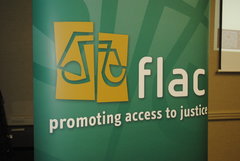Government must finally grasp nettle of long-term arrears cases
2 September 2014

Figures released this morning by the Central Bank again show an overall reduction in the number of homes in mortgage arrears in the second quarter of 2014. However legal rights group FLAC (Free Legal Advice Centres) has identified three issues of concern in the new data: the continued increase in longer-term arrears cases, accelerated rate of applications to repossess homes, and the sustainability of mortgage restructures.
While all other categories have decreased, the upward trend continues in the number of homes falling into long-term arrears, with the number of accounts in arrears for more than 2 years up by 5%. The average amount of arrears on these accounts has gone up by about €1200, to €47,300 per home.
Further, the number of new applications to repossess in the quarter is 3,274, the highest quarterly figure yet. Commented FLAC Senior Policy Analyst Paul Joyce, “This means that nearly 10,000 new applications to repossess family homes were made in the 12 months from July 2013 to the end of June 2014. So far, these applications to repossess are not resulting in large-scale repossessions. Nonetheless, in nearly 300 cases, the court granted an order for sale or repossession in Q2 2014.”
There is also a 10% increase in the number of restructured accounts, but this was almost entirely attributable to arrears capitalisations and split mortgages. “The long-term sustainability of these methods of restructure is questionable, in FLAC’s view, and we have little information on how restructured cases are faring,” added Mr Joyce.
According to FLAC Director General Noeline Blackwell, “The trends shown in these mortgage arrears figures are consistent with what we see across all our areas of work in FLAC, whether on our telephone information line or in our work on social welfare law. We find that more of our contacts are from people who are in deeper difficulty, giving rise to a worry that those who became seriously over-indebted at the start of the economic crisis are not pulling out of difficulty now, but rather becoming mired more deeply.
“We in FLAC are concerned that in the discussion and speculation around the October Budget, there is insufficient focus from Government on helping those who remain in poverty as a result of and from before the ‘Great Recession’. In the mortgage debt area, for example, it is unconscionable that those in long-term arrears do not have access to adequate systems of support and thus have to largely fend for themselves,” concluded Ms Blackwell.
/ENDS
_____________________________________________________________
Editors’ notes:
- FLAC (Free Legal Advice Centres) is a human rights organisation which exists to promote equal access to justice for all. FLAC is an NGO that relies on a combination of statutory funding, contributions from the legal professions and donations from individuals and grant-making foundations to support its work.
- FLAC offers basic legal information through its telephone information line (1890 350 250) and free legal advice through its network of 80 volunteer evening advice centres – more on our website. It also campaigns on a range of issues including personal debt, fairness in social welfare law, public interest law and civil legal aid.
- Central Bank of Ireland Residential Mortgage Arrears and Repossessions Statistics for Q2 2014 are available on the Bank's website.